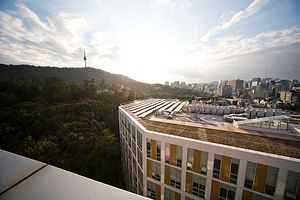Last month, a Seoul-based bank found itself in the center of public criticism. In a job advertisement for a “North Korean expert,” the bank said candidates should have either a Ph.D. in a relevant field or have earned more than $55,000 per year at a previous job.
The bank explained that since the position it was looking to fill required professional knowledge and experience in North Korea, it was necessary for candidates to have a higher degree in the field. The bank added that it believed those who have made more than $55,000 have the equivalent qualification.
Despite the bank’s explanation, it did not stop public criticism that the amount of money one earns has no connection with his or her ability or qualification. It is unclear whether the bank has been able to fill the vacancy.
This case is just one of a common trend that has been seen in South Korea recently. More and more companies are looking to hire so-called North Korean experts amid expectations of an improved inter-Korean relationship as they hope to benefit from reduced tensions. The issue seems to be, however, that companies do not know whom to hire and based on what qualifications.
This is related to the lack of institutions in South Korea for people develop their knowledge in North Korean studies.
Some might wonder why South Koreans need to study North Korea. After all, they both speak the Korean language and both nations were formerly united as one entity.
Nam Sung-wook, a professor of North Korean studies at Korea University, has the answer. “Although they are the same people, they have been divided for 70 years, and therefore their systems, ideologies, and cultures are all different,” Nam noted.
Though there are differences based on curriculum, North Korean studies is usually categorized to include North Korean language, history, economy, politics, international relations, and inter-Korean relations as well as cooperation. Domestic universities first launched North Korean studies majors in the mid-1990s.
Seoul-based Dongguk University was the first to introduce such a major at its undergraduate school in 1994. It was followed by Myongji University in 1995, Catholic Kwandong University in 1996, Korea University in 1997, Chosun University in 1998, and Sun Moon University in 1998. They started a sudden boom in North Korea studies.
However, these glory days did not last long. Due to the sudden increase in supply, universities struggled to find students to take. The strained inter-Korean relations also did not help.
Chosun University closed its major within a year, while Catholic Kwandong University did the same in 2006. Myongji University, Sun Moon University, and Korea University merged their majors into other relevant departments, including international relations or political science studies.
As of the end of May 2018, only two higher educational institutions were operating North Korean studies as a separate major, namely Dongguk University and the University of North Korean Studies. However, the latter only offers graduate-level studies.
As mentioned above, strained inter-Korean relations are often blamed for the dearth of North Korean studies programs. As inter-Korean relations rapidly deteriorated in the late 2000s, the demand for professionals with relevant knowledge naturally decreased as well. For instance, Hyundai Asan, which had carried out business with the North such as tours of Mount Kumgang, reduced its staff from about 1,080 to 260 after 2008, when a North Korean soldier shot a South Korean tourist during the tour.
The Ministry of Unification hires professionals specializing in North Korean matters, but only about two people a year have been recruited. As it became difficult for graduates of North Korean studies to find a job, fewer students wanted to major in the subject.
Some also blame a South Korean government initiative that implemented a restructuring of ‘uncompetitive’ universities. Over the past few years, the government has been actively pushing this initiative by evaluating universities across the country. Those who fail to meet its criteria are hit with penalties, including a suspension of subsidies or, in the worst case, the closure of the university itself.
One of the main criteria is the employment rates of graduates and acceptance rates of first-year students, which universities with a North Korean studies major have struggled to increase.
Korea Higher Education Research Institute’s Lim Eun-hee said that a long-term approach and view is needed for the government and universities to operate and nurture North Korean studies. She noted that it is essential to prepare for increasing cooperation between the two Koreas amid improving inter-Korean relations. How things actually play out on this front, though, remains to be seen.

































